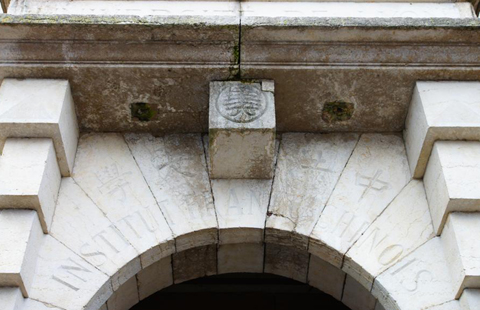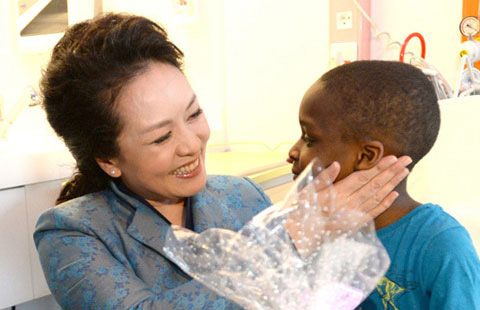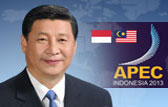
UNESCO's achievements in China hailed
Updated: 2014-03-27 20:32
By Zhao Xinying (chinadaily.com.cn)
Comments Print Mail Large Medium SmallExclusive interview with director and representative of UNESCO Beijing Office
The United Nations Educational, Scientific and Cultural Organization Beijing Office has built a close relationship with China over the last 30 years and made a series of achievements, said Abhimanyu Singh, director and representative of the UNESCO Beijing Office.
"2014 marks the 30th anniversary of UNESCO Beijing. Through its 30 years of operation in China, UNESCO has built strong relationships with the government of China, line ministries, academia, NGOs, civil society and media. These relationships have been complemented by the productive working partnerships that UNESCO has with other UN agencies in the country," Singh said.
One example is the China and UNESCO's South-South cooperation.
"With funding support from China in the range of $8 million, a South-South cooperation project was initiated between China and UNESCO in 2012, with focus on Africa," Singh said, adding that the project involves investments in equipment and capacity development of at least one key teacher training institution in each of the eight participating countries, including Ethiopia, Namibia, Congo, Liberia, Uganda and Tanzania.
Support from private sectors in China was also appreciated, Singh said.
For example, UNESCO has initiated a private sector project, which has been implemented since 2007 to better manage and conserve six World Heritage sites in China, with $4 million in financial support from the Mercedes-Benz Star Fund.
According to Singh, additional resources from donors, as well as UNESCO's engagement with its traditional and new partners in China have helped UNESCO fulfill its comprehensive mandate with limited resources.
"UNESCO will further maximize the impact and sustainability of its activities through these partnerships and its network," he said.
Apart from the cooperation with China, the UNESCO Beijing Office is also committed to contributing to UNESCO's mission in the region, addressing the social, environmental, economic and cultural dimensions of sustainable development.
"In its 30 years of operation in China, profound achievements have been made, and the quality and impact of UNESCO's work in China has earned respect and credibility from the government of China, all partners and civil society," Singh said.
One case worth mentioning is UNESCO Beijing's support for the Achievement of Education for All by 2015, Singh said.
Achieving Education for All by 2015 is a commitment made by 164 countries, including China. As the lead global coordinator for the commitment, UNESCO has given top priority to assisting its member states to accelerate progress in EFA.
"UNESCO Beijing Office provides intellectual, strategic and technical advice to support China in its commitment. Within this context, UNESCO provides policy advice in the preparation of the National Medium and Long Term Education Reform and Development Plan Outline 2010-2020," Singh said, adding that they also contributed to the development of the Educational Modernization Monitoring and Evaluation Indicators, which serve as a guide in promoting a more balanced education system by 2020.
Besides, the 8th National EFA Forum in China was organized by China's Ministry of Education and National Commission for UNESCO, with support from UNESCO and UNICEF, and UNESCO has also joined hands with UNICEF to support the production of the China EFA 10-year Report (2000-2010), Singh noted.
And that's only a small part of what the UNESCO Beijing Office has done in China.
Other activities it engaged in included advocating for skills development through technical and vocational education and training, using new media to increase HIV and sexuality knowledge among Chinese young people, providing contributions to ending violence against women through baseline studies and research and introducing UNESCO science documents to Chinese audience.
However, Singh said the UNESCO Beijing Office still faces some challenges, as China is experiencing a period of unprecedented growth and change.
These challenges include the equitable and balanced development of education across the country, the disparities in economic, social and political rights of all citizens, significant numbers of endangered species, many areas adversely affected by land degradation, pollution, industrialization and urbanization, and the scarcity and pollution of water resources.
But these factors don't affect Singh confidence in China.
"The experience and expertise that UNESCO has garnered from the last three decades of operation in China suggests that we are well positioned to assist China in achieving its goals and addressing these challenges," he said.
Fact box - China and UNESCO
UNESCO was founded in 1945 as a specialized agency of the United Nations. By promoting international collaboration through its five major programs — education, natural sciences, social and human sciences, culture, and communication and information, UNESCO’s purpose is to contribute to peace and security, furthering universal respect for justice, the rule of law, human rights and fundamental freedoms.
A special highlight in the relations between China and UNESCO is that for the first time in UNESCO’s history since 1945, the presidency of the UNESCO General Conference, which determines the policies and the main lines of work of the organization, is occupied by China from November 2013 to November 2015.
Key figures of UNESCO programs in China
China has 45 properties on the World Heritage List, which ranks second in terms of the number of sites: 31 cultural, 10 natural and 4 mixed properties.
29 Geoparks participating in the UNESCO Global Geoparks Network, with a great number of outstanding sites. China has the highest number of Global Geoparks of any country in the world.
Altogether, China has 38 elements on the Lists of the Convention for the Safeguarding of Intangible Cultural Heritage: 30 on the Representative List, seven on the Urgent Safeguarding List and one on the Register of Best Safeguarding Practices. It is the most represented country in these mechanisms. The list includes a number of well-known cultural practices and expressions, such as Peking Opera, Kunqu Opera, Chinese Paper cutting and Acupuncture and moxibustion of traditional Chinese medicine.
In May 2011, UNESCO designated Chinese opera performer Zhang Jun as an Artist for Peace. The designation was made in recognition of Zhang’s long-term commitment to promoting intangible cultural heritage, especially the Kunqu Opera. As an Artist for Peace, Zhang will help raise national and international awareness of the importance of intangible cultural heritage and its safeguarding, including Kunqu Opera.
Source: UNESCO Beijing Office






